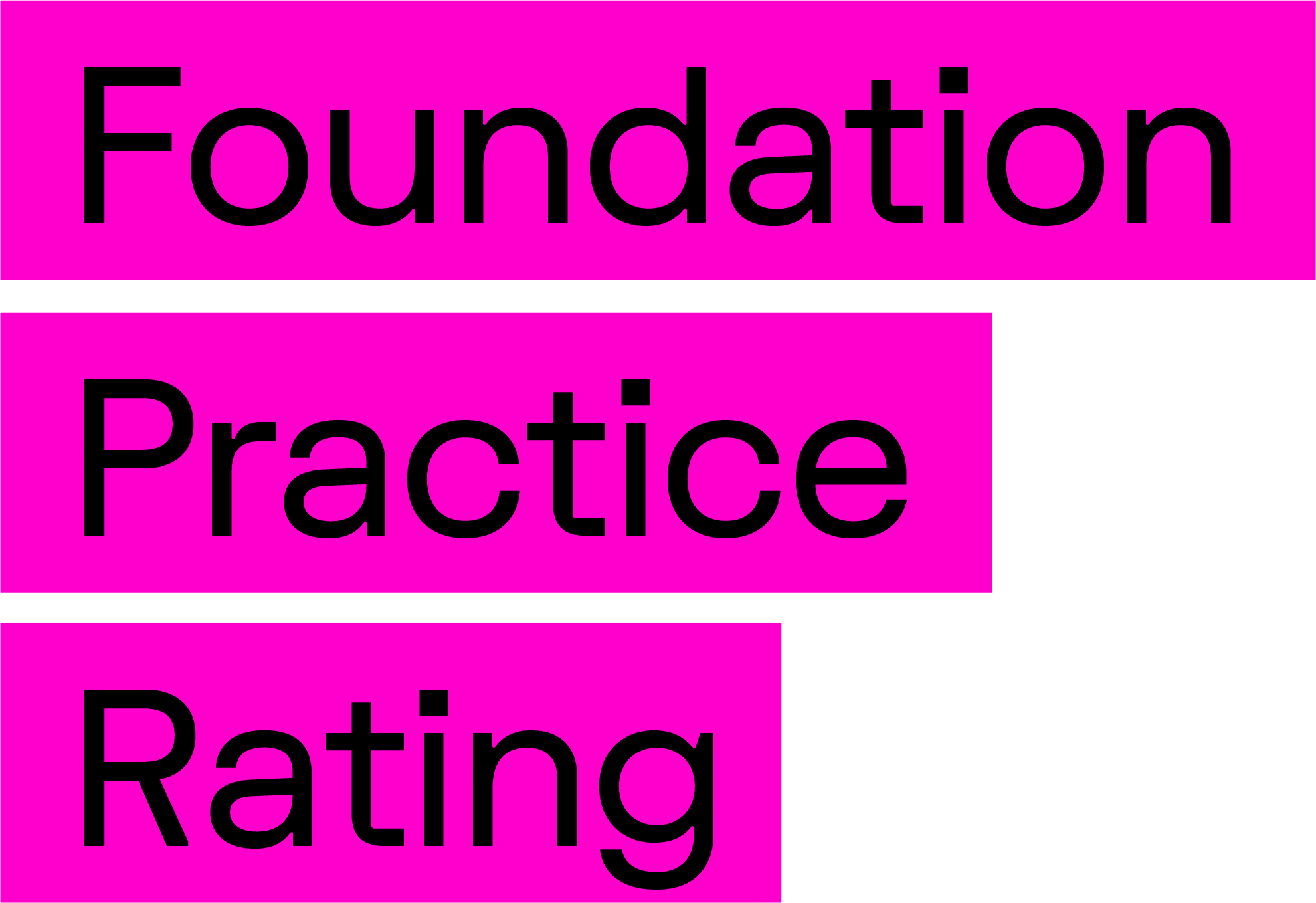Methods
The Foundation Practice Rating enables the foundation world, to be publicly accountable for the disclosure of its activities and the diversity of its leaders.
A rating system is not a ranking, meaning foundations are not compared with each other.
As the FPR utilises standards established by a broad spectrum of stakeholders, it uncovers the elements of diversity, accountability, and transparency considered most crucial by others. This, in turn, enables foundations to channel their endeavours towards enhancing these aspects of their operations. Moreover, the FPR draws on exemplary approaches from diverse domains, including the public and business realms.
A primary objective of the FPR is to prompt foundations to explore the resources and assistance available for enhancing their effectiveness and responsibility. Furthermore, it fosters fresh conversations about foundation practices and the processes involved in making informed decisions.
This work is intended to complement initiatives such as, ACF Stronger Foundations, 360Giving, IVAR’s Open and Trusting Funders, DEI Coalition, Future Foundations, and Funders for Race Equality.


How the rating system works
The assessment exclusively targets grant-making foundations registered in the UK, excluding entities replenished by government funds like research councils.
The selection of foundations subject to evaluation comprises around 300 of the largest foundations drawn from the dataset in UK Grantmaking including community foundations. Data employed for the assessment is sourced independently from publicly available outlets.
The FPR encompasses a set of criteria against which each foundation is independently evaluated by an impartial assessor. The criteria delineate the specific requirements for meeting each standard. The evaluation process encompasses three focal points: diversity, accountability, and transparency.
These criteria are informed by existing standards in other sectors, as well as input from an annual consultation including grantees, grant seekers, and other stakeholders in this domain.
How we select the sample
For the first three years of the Foundation Practice Rating, we drew our cohort of 100 foundations by using the Giving Trends report which was published annually by the UK’s Association of Charitable Foundations (ACF). This analyzed the top 300 UK foundations based on their giving budget. We also used list of community foundations produced by UK Community Foundations.
ACF has now stopped producing the Giving Trends report, so FPR must change how we determine our cohort. Instead of Giving Trends, 360Giving has produced UK Grantmaking, which hold data on a larger set of funders, including non-charitable ones.
It is produced in collaboration with the Association of Charitable Organization, UKCF, and London Funders. We will use UK Grantmaking to determine our cohort of foundations from now on.
Our aim is to keep the cohort as consistent as possible with the previous pool of foundations. We will maintain the 3 elements of the cohort:
- The foundations that fund this work. The ‘Funders Group’ are assessed using the same criteria and process, as part of their own strategies for self-improvement and to support change in the whole sector.
- The 5 largest foundations in the UK: these trusts give a large proportion of the total given by foundations in the UK. These will be selected from UK Grantmaking.
- A stratified random subset of other foundations. These are selected from UK Grantmaking.
The selection gives a cohort of foundations that is consistent with previous years, with a fifth of the foundations are in the top quintile (by annual giving budget), a fifth in the second quintile, and so on.
One non-charitable grant-making foundation, the Joseph Rowntree Reform Trust, is also included because it contributes funding to the FPR. It is assessed in exactly the same way as the charitable foundations.
In response to feedback, foundations are offered the option to opt in to the FPR. Such foundations pay a small fee to cover the research work. Their results are published separately but alongside the main analysis to avoid the selection effect skewing the results.
The method behind the rating
- Gathering the data
Data is gathered on the foundations using only publicly available information, specifically the foundations’ websites or the information provided on the relevant charity regulators’ websites (including the annual report). Each foundation is assessed twice by two independent researchers. If there are any discrepancies in the two scores these are resolved through discussion and searching for missed information. The data is then sent to the foundations to check to ensure that it is accurate.
- Scoring the data
Not all questions are relevant to every foundation. For example, a foundation that only funds by invitation does not need to publish its eligibility criteria. When a criterion is not relevant to a foundation, they are not scored on that criterion. Allowing these ‘exemptions’ means that the maximum score within a pillar varies between foundations. A foundation’s score for each pillar is then divided by the maximum possible score for it on that pillar, giving a percentage, which is the foundation’s final score on that pillar. The full list of exemptions can be accessed here.
- Determining the rating
The foundation’s scores are converted into a grade. There are four grades – from A (the top) to D. Using four grades is based on UK public sector rating/quality assessment systems which often have four (e.g, Ofsted’s ratings of schools, HM Inspectorate of Prisons’ system and the Care Quality Commission’s system). The FPR reports each foundation’s grade on each pillar but not the numerical scores. This is to prevent a ranking being constructed from the data. The foundations are also awarded an overall score, which is the average of the pillar scores.
Who carries out the assessment?
The research consultancy and think-tank Giving Evidence carries out the assessment under the direction of philanthropy expert Caroline Fiennes.
For more details please download the full report below:

